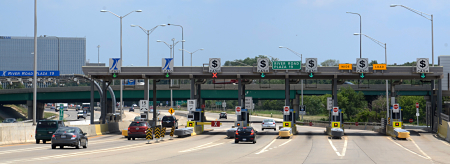Rhode Island DOT gets environmental clearance for truck tolls
Rhode Island’s Department of Transportation (RIDOT) in December received environmental clearance for two truck electronic toll locations along Interstate 95 in southern Rhode Island.
The Federal Highway Administration’s Finding of No Significant Impact (FONSI) means the state can proceed with installing electronic toll gantries at two locations, marking the first truck tolls in the state.
“We thank the FHWA for their diligence in this matter,” RIDOT Director Peter Alviti, Jr. said. “The Finding of No Significant Impact confirms what we have been saying all along, that truck-only tolling will not have an adverse impact on the communities along our highways. It is a fair system addressing a user fee for the large trucks who do the most damage to our roads and bridges, and will provide a dedicated and reliable revenue stream to help maintain our transportation system.”
Collections from tractor-trailer trucks are expected to begin at two tolling locations along Interstate 95 in Richmond and Exeter in the southwestern part of the state, according to RIDOT spokesman Charles St. Martin.
Under the new “RhodeWorks” plan, 18-wheelers will pay up to $20 to cross the state on Interstate 95. A single truck will be capped at paying $40 a day. The tolls are expected to bring in around $45 million a year once they are up and running, which the governor said will take at least a year to install.
Construction, originally announced for late-2017, has now been pushed back to spring of 2018.
Ultimately, St. Martin said, tolls will be collected along six major highway corridors at 12 locations in the state. Each location is associated with a bridge or bridge group and the tolling revenues will be used to repair or replace the bridge location with which it is associated, he said.
RIDOT plans to repair or replace 35 bridges with the truck-only toll revenue. Cars will not be charged tolls.
Chris Maxwell, president of the Rhode Island Trucking Association, said the state needs to look at diversion plans for trucks that seek to avoid the tolls.
He said RIDOT needs to study how such diversions will affect local communities. For example, he said a truck making a delivery or pickup in Providence may avoid taking I-95 and instead take Interstate 395 in Connecticut and a two-lane road such as Route 6 to Providence. That would create congestion, safety and road degradation issues.
In early December, the American Trucking Associations (ATA) challenged the state’s environmental assessment, urging the FHWA to reject the findings. ATA claimed that the report contained several errors and made clear its opposition to the truck-only tolls, stating that they set a dangerous precedent for other states.
ATA president Chris Spear vowed to fight against the truck tolls and declared the lobby’s intent to defeat the tolling portion of Rhode Works through any legislative, regulatory, and legal means.
Spear said that the truck-tolling program would establish a dangerous precedent for other states. “This effort is still in the early stages and we intend to fight this battle for as long as it takes.”
“Implementing truck tolls will increase the cost of goods for every consumer in Rhode Island, which makes the accuracy, transparency, and reliability of RIDOT’s public reporting obligations critically important to every Rhode Island family,” said Maxwell. “Given the profound, long term, costly burden on the citizens of our state, RIDOT’s fatally flawed EA report cannot be relied upon to make such a critical decision.”
“When they come through Rhode Island, they don’t even stop to get a coffee,” said the bill’s sponsor, Senate Majority Leader Dominick Ruggiero, as he closed the debate. “They just keep on going and wreck our roads.”
Rob Lafleur of the Rhode Island Independent Contractors said small trucking firms would suffer under the new plan. “These mom and pop companies run on a shoe-string. We were hoping that they would realize that the impact that this toll program would have is significant.”






